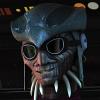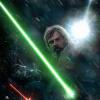Register now to gain access to all of our features. Once registered and logged in, you will be able to create topics, post replies to existing threads, give reputation to your fellow members, get your own private messenger, post status updates, manage your profile and so much more. If you already have an account, login here - otherwise create an account for free today!

Official Rule Clarifications !!Direct replies FFG only!!
#81

 Posted 27 August 2013 - 04:42 AM
Posted 27 August 2013 - 04:42 AM

What is the result of an AT-AT attempting to use it's Reaction Ability to discard Subzero Defenses, when it is the first unit striking against a Hoth Objective?
Reply:
The AT-AT effect resolves when the AT-AT is focused to strike, and changes the resolution of the strike.
Subzero Defenses does not resolve until after the attacking unit's strike resolves.
So the AT-AT can take out the Subzero Defenses enhancement before the enhancement has a chance to destroy the AT-AT. As Subzero defenses is no longer in play after the strike resolves, the AT-AT would survive in this scenario.
Nate French
#82

 Posted 01 September 2013 - 01:01 AM
Posted 01 September 2013 - 01:01 AM

Once the Echo Caverns effect resolves, you have a situation where one unit has a lasting -1 (ICON TYPE) and another unit has a lasting +1 (ICON TYPE) being applied to it until the end of the phase.
Example 1: I have a Guardian of the Peace with a Jedi Lightsaber and I use Echo Caverns to move a blast damage from the Guardian to a second unit. An AT-AT strikes and blows up the Lightsaber. The second unit retains the +1 (Blast Damage) until the end of the phase. What happens to the Guardian, or to the Lightsaber, is irrelevant once the Echo Caverns Effect resolves.
Example 2: Let's say I attack an objective with a speeder and use Echo Caverns to transfer a white blast damage to it from Rogue 2. The -1 (WHITE BLAST) effect persists on Rogue 2 until the end of the phase. The number of +1 (WHITE BLAST) will change as game state changes. We now have a lasting effect and a constant effect, both working to modify the unit's icons. So:
- Attack with a speeder: Rogue 2 gets +1 (WHITE BLAST).
- Echo Caverns: Rogue 2 now has a +1 (WHITE BLAST) from its constant effect, and a -1 (WHITE BLAST) from Echo Caverns lasting effect, being applied.
- Engagement ends: Rogue 2 now is only under the influence of the -1 (WHITE BLAST) from Echo Caverns.
- New engagement begins, attacking a new objective with Rogue 2: Rogue 2 now has a +1 (WHITE BLAST) and a -1 (WHITE BLAST) being applied, for a total modification of zero.
(The above is another application of FAQ entry 2.9: Any time a new modifier is applied, the entire quantity is recalculated, considering all active modifiers.)
#83

 Posted 09 September 2013 - 08:13 PM
Posted 09 September 2013 - 08:13 PM

Hi Nate,
can you tell me what "dealing damage" exactly means?
Let's take Chewbacca:
If an opponent deals one damage to Chewbacca during an engagement and this damage is instead placed on a Guardian of Peace who has been "dealt" damage? Chewbacca has still been dealt damage and it was just placed on the Guardian instead? Or has the damage now been dealt to the Guardian as a replacement effect?
Answer by Nate:
A unit has been dealt damage if that damage actually makes it to the unit. If protect moves it to someone else, or if it is prevented by a shield, the unit itself is not aware of the damage, and Chewbacca cannot react to damage that does not reach him.
#84

 Posted 09 September 2013 - 08:16 PM
Posted 09 September 2013 - 08:16 PM

My opponent plays Get me solo! Does he have to name the unit before I decide if I want to cancel the event?
Answer by Nate:
Naming the unit is part of the resolution of the event's effect. The opportunity to cancel should be observed when the card is played, before the effect begins to resolve. The light side player cannot wait to see what is named before he decides to cancel.
The dark side player should give the opponent a chance to cancel before announcing a name. If he does not, and just announces a name without acknowledging this opportunity, he has tipped his hand and given his opponent too much information.
- Jhaelen likes this
#85

 Posted 11 September 2013 - 03:11 PM
Posted 11 September 2013 - 03:11 PM

Narrow Escape states: Interrupt: When your opponent chooses a single target for a non-capturing card effect, choose a new target for that effect. The new target is chosen as if you executed the effect.
If the card being played has targeting restrictions, does the new target chosen by the LS player have to meet those restrictions? e.g. If DS player played Force Lightning, does the LS player's new target also have to be an exhausted unit?
Response:
You have to meet the targeting restrictions of the DS effect. So with Force Lightning, you would have to select an exhausted unit.
Note that this applies to targeting restrictions only. The timing trigger of an interrupt or reaction being Narrow Escape has already been met, and all you are doing with Narrow Escape is selecting a new target.
Nate French
Senior LCG Designer
Fantasy Flight Games
- hundreds likes this
#86

 Posted 12 September 2013 - 05:23 PM
Posted 12 September 2013 - 05:23 PM

Rule Question:
I noticed that a question you answered regarding A Narrow Escape was posted to the cardgamedb forums regarding the type of target needed by the LS player. If there is no valid target, such as an exhausted unit when attempting to play A Narrow Escape on Force Lightning, can A Narrow Escape still be played, primarily to avoid getting zapped by Force Lightning? In other words, the DS player plays Force Lightning attempting to destroy a target LS exhausted unit. I play A Narrow Escape. He has NO exhausted units. Do I just not complete that part of A Narrow Escape?
Response:
Effects that choose a target must have an eligible target in order to be played. From the rules, page 27, under TARGET: "If there is no valid target for an effect, the effect cannot be played." So if the player playing Narrow Escape cannot choose a new target, he could not play the card in the first place.
...
Guess I should have reread those rules, huh.
#87

 Posted 13 September 2013 - 03:12 PM
Posted 13 September 2013 - 03:12 PM

Rule Question:
If I play First Marker on an Objective, can that objective still be damaged by the Reaction ability on AT-AT Assault Formation, or is the damage limitation from vehicles limited to just combat icons?
Response:
First Marker would protect the objective from both combat damage from a Vehicle unit, as well as card effects that originate from a Vehicle unit.
#88

 Posted 25 September 2013 - 08:54 PM
Posted 25 September 2013 - 08:54 PM

FFG Response: Targeted Strike is a card effect, but it only affects the card that has the keyword, by altering the way that the unit with targeted strike can resolve its combat icons. When resolving those combat icons, they are still treated as a game effect, and resolve as per a normal strike, now with an expanded "scope" as to what they can hit.
The description for targeted strike *does* include the word 'target' to ensure that there *is* something to affect with the combat icons. You are not allowed to targeted strike nothing just to avoid using your unit combat icons within an engagement. (For example, if for some reason you wanted to avoid killing a particular enemy unit that was opposing you; there would need to be a unit not participating in the engagement for you to target with targeted strike if you wanted to avoid damaging that opposing unit.)
Luke, or any other unit with targeted strike, *would* be able to target the Executor with their unit damage icons using targeted strike.
- Crouton, Magni, divinityofnumber and 1 other like this
#89

 Posted 26 September 2013 - 12:55 PM
Posted 26 September 2013 - 12:55 PM

Q: Can a unit with targeted strike hit the Executor?
FFG Response: Targeted Strike is a card effect, but it only affects the card that has the keyword, by altering the way that the unit with targeted strike can resolve its combat icons. When resolving those combat icons, they are still treated as a game effect, and resolve as per a normal strike, now with an expanded "scope" as to what they can hit.
The description for targeted strike *does* include the word 'target' to ensure that there *is* something to affect with the combat icons. You are not allowed to targeted strike nothing just to avoid using your unit combat icons within an engagement. (For example, if for some reason you wanted to avoid killing a particular enemy unit that was opposing you; there would need to be a unit not participating in the engagement for you to target with targeted strike if you wanted to avoid damaging that opposing unit.)
Luke, or any other unit with targeted strike, *would* be able to target the Executor with their unit damage icons using targeted strike.
So according to this you can target it because it has the word target.? Kinda confused honestly. I blame getting up at 3am for work.
#90

 Posted 26 September 2013 - 02:35 PM
Posted 26 September 2013 - 02:35 PM

No, you can target it because Targeted Strike is a card effect that affects the striking card and allows that card to target a game effect (not a card effect).So according to this you can target it because it has the word target.? Kinda confused honestly. I blame getting up at 3am for work.
- Magni, divinityofnumber, Tjglaser and 3 others like this
#91

 Posted 27 September 2013 - 05:10 PM
Posted 27 September 2013 - 05:10 PM

Reply:
Here's how it would work:
1) Aggression is played.
2) Each player now has to choose a unit to sacrifice.
This invokes: 2.2: "If a single effect affects multiple players simultaneously, but the players must individually make choices to resolve the effect, the player who played or executed the effect chooses first, with priority then proceeding clockwise around the table."
So the dark side player, who played the effect, chooses who he will sacrifice first. Note that he is only choosing at this time -- the unit he chooses is not sacrificed yet.
3) After the dark side player has made his choice, the light side player chooses who he will sacrifice. Note that he is only choosing at this time -- the unit he chooses is not sacrificed yet.
4) Once all players have chosen who they will be sacrificing, the effect resolves, and all chosen units are sacrificed simultaneously.
5) The Executor may now trigger its reaction once for each sacrificed unit. It must resolve the first of these two reactions in full before initiating the second. (So it's basically: "Trigger in reaction to one unit being sacrificed, go through entire resolution, then trigger in reaction to other unit being sacrificed, and go through entire resolution.")
Nate French
Senior LCG Designer
Fantasy Flight Games
#92

 Posted 02 November 2013 - 03:51 PM
Posted 02 November 2013 - 03:51 PM

The Rulebook says the following:
"After all units participating in the engagement are exhausted (either by striking, by receiving a focus token during a :tactics icon resolution, or by other card effects), the resolve strikes step is over."
Does the "Resolve Strikes" end immediately after the last participating unit is exhausted, before Chewbacca gets a chance to strike?
Example 1:
Opponent attacks unopposed with a Dark Side Apprentice and a Snowtrooper. They automatically win the Edge battle and strike with their Dark Side Apprentice. (Can Chewbacca strike here?) The Dark Side player strikes with the Snowtrooper. (Can Chewbacca strike here, if he did not previously?) Engagement ends.
Example 2:
I attack an objective with my Red 5, and my opponent defends with Devastator. I win the Edge, and strike with my Red 5. My opponent strikes with Devastator. (Can Chewbacca strike here?) Engagement ends.
Hello,
The end of an engagement is determined by following the appropriate steps in the flow chart on page 31 of the rulebook:
After the edge battle is complete, there is a player action window.
Then, there is a framework window, where the player who won the edge resolves one strike, if able. A unit may strike from outside the engagement at this time if it is able to do so.
Then, there is another player action window.
Then, there is a framework window, where the player who lost the edge battle resolves one strike, if able. A unit may strike from outside the engagement at this time if it is able to do so.
Then, there is another player action window.
At this point, there is a framework window that says "repeat if any participating units are still ready." If there are no ready participating units at this time, the game automatically proceeds to the "check for surviving units...." framework.
Any time you get to the "repeat if any participating units are still ready" step, and there are no ready participating units, the engagement will proceed to its resolution. Anytime before you reach that step, if it is your turn to strike, you may strike with an "outside of engagement eligible unit" (like Chewbacca with his Bowcaster.
Nate French
Senior LCG Designer
Fantasy Flight Games
nfrench@fantasyflightgames.com
- orso likes this
#93

 Posted 07 January 2014 - 02:21 PM
Posted 07 January 2014 - 02:21 PM

I have a question about the interaction with Jabba the Hutt and limited cards.
Limited. (You cannot play more than one limited card each turn.)
Jabba
Action: Focus this unit to put a unit or enhancement of printed cost 2 or lower into play from your hand.
From the rulebook:
put into play
A card that is â?oput into playâ?ˇ is placed in the play area designated by the card text at no resource cost and ignoring any play limitations.
By this, I understand that if I played a limited card from hand, I could also use Jabba to put a second into play from hand?
-----------------
Correct, limited only applies to cards that are "played," not to cards that are "put into play." Jabba's "put into play" effect would bypass the limited keyword.
Nate French
Senior LCG Designer
Fantasy Flight Games
#94

 Posted 09 January 2014 - 07:55 AM
Posted 09 January 2014 - 07:55 AM

#95

 Posted 09 January 2014 - 08:08 AM
Posted 09 January 2014 - 08:08 AM

But to walk thru it before they go, here's my take ... ASI happens first (as declaring attackers happens first) and a condition is applied to an opponent's unit that must be done, if able. Then declaring defenders is done and ARM's constant kicks in. If the defending player only has one unit, then the defending player cannot fulfil the condition, that 2 defenders must be chosen, so therefore ASI's condition is abandoned. It's unable to be fulfilled. If the defending player has 2 or more ready units able to be declared as defenders, and the chosen one with the condition is one of them, then the condition must be fulfilled and the chosen unit and one other must be declared as defenders.
#96

 Posted 09 January 2014 - 09:40 AM
Posted 09 January 2014 - 09:40 AM

Here is Nate's answer:
Hey Max,
The short answer is yes, player action windows are open to all players when they arise. So any player may play a valid event in a player action window.
The switching of active player is not done in a phase to phase manner. If we are teammates, for instance, there is not "my conflict phase," and then "your conflict phase." There is a single conflict phase, in which we take turns being the active player for the specified framework events (those detailed under "turn sequence and phase instructions on page 7 of the multiplayer rules) that necessitate an active player. I think this is an important distinction:
In regards to your question about the multiplayer rulebook stating that each player must complete a phase before his partner can become an active player, please note that it's not the "completion of these phase per play" that is being discussed, but rather specific steps within a phase.
I can see where the confusion is coming from, and will see if we can get something into the FAQ to make this more clear. Thanks for the questions!
Nate
#97

 Posted 09 January 2014 - 01:38 PM
Posted 09 January 2014 - 01:38 PM

Yes, the Death Star II is considered a unit while in play. If it is returned to your hand, you may still replay it on the side that has a printed cost, and subsequently use the Action effect to turn it back over. We are looking at some FAQ possibilities to close this interaction, but as of now this play does work as written.
#98

 Posted 01 February 2014 - 03:04 AM
Posted 01 February 2014 - 03:04 AM

Spice Visions reads:
"Interrupt: When a focus token would be placed on a Character or Creature unit you control, damage that unit instead."
When a character/creature unit committed to the Force is focused to strike, and Spice Visions is played, does the unit take 2 damage or 1 damage and 1 Focus token.
Additionally, if a character is used to produce 2 resources and Spice Visions is played, does the unit take 2 damage or 1 damage and 1 focus token?
----------
From Nate
It will be 1 focus and 1 damage in each case. The spice visions is only responding to one of the focus tokens being placed, the other one is unaffected.
Nate French
Senior LCG Designer
Fantasy Flight Games
#99

 Posted 22 February 2014 - 12:48 AM
Posted 22 February 2014 - 12:48 AM

Question:
For purposes of effects, are light side cards and dark side cards defined by their red vs blue backing (ie who owns them) or by who controls them?
Answer:
Defined by ownership (card backs).
Rulebook, page 26 "Only LS cards can be captured." Even if the light-side player controls the card, it is still a DS card. You would need an explicit exception to be able to capture a DS card (something worded like "capture a target dark side card.") Without that, you are unable to capture a DS card that the LS player currently controls.
--
Erik Dahlman
Associate LCG Designer
Fantasy Flight Games
#100

 Posted 14 March 2014 - 08:52 PM
Posted 14 March 2014 - 08:52 PM

Since getting into game of thrones lcg and going through a bunch of their rules and timing I've come across this thread:
http://www.cardgamed...ules-questions/
It is such an awesome resource of rules/timing collection.
I would gladly volunteer to do so but I didn't start the post nor can I moderate anything. So I'm not asking someone to do something I wouldn't.
Would starting a new thread be worth it? Is there a chance it would get stickied?



 Sign In
Sign In Create Account
Create Account


 Back to top
Back to top


















